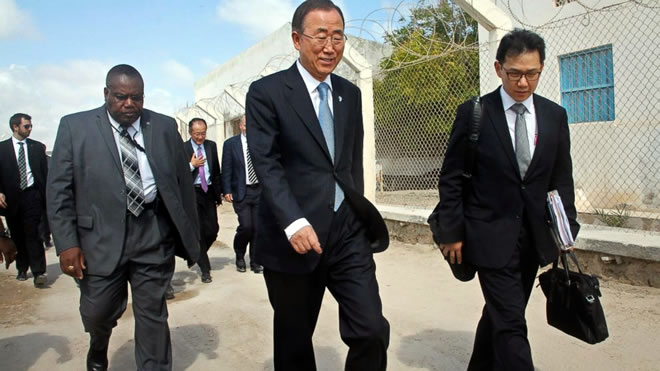
U.N. Secretary-General Ban Ki-moon, center, walks inside the heavily-protected airport complex during a visit to Mogadishu, Somalia Wednesday, Oct. 29, 2014. Ban's fashion choices are not typically newsworthy but are significant in Mogadishu. On his trip in 2011, he wore a U.N.-branded bullet-proof vest, and the fact that his security advisers did not insist on war-time protection on this trip, at least inside the well-protected airport complex, is seen as another indication of Mogadishu's improving security. (AP Photo/Farah Abdi Warsameh)

By ABDI GULED Associated Press
Wednesday, October 29, 2014
U.N. Secretary-General Ban Ki-moon made his second trip to Somalia's capital on Wednesday, walking around the seaside airport complex in a dark business suit.
Ban's fashion choices are not typically newsworthy but are significant in Mogadishu: On his trip in 2011, he wore a U.N.-branded bullet-proof vest.
The fact that his security advisers did not insist on war-time protection on this trip — at least inside the well-protected airport complex — is seen as another sign of Mogadishu's improving security.
Ban traveled to Mogadishu with World Bank President Jim Yong Kim and Islamic Development Bank President Ahmad Mohamed Ali Al-Madani. He said the group knows that the political, security and development challenges are huge but that many indicators are "finally pointing in the right direction" and that security and development must now go hand in hand.
"Slowly but surely Somalia is waking from a long nightmare," Ban said. "The country is at a pivotal moment. Al-Shabab's power is declining, but it is not gone."
Ban congratulated Somali and African Union forces for their advances against the militants and said it is critical they secure roads to newly recovered areas to enable humanitarian access and commercial traffic.
One of the perennial problems Somalia still faces is hunger. Ban noted that more than 3 million Somalis are in need of food aid and he urged donors to increase contributions "to avert another famine" such as the country saw in 2011.
During private meetings, Ban urged political unity between Somalia's feuding president and prime minister, and he demanded transparency in the use of government funds.
The African Union military force, which forced the militant Islamic group al-Shabab out of Mogadishu in 2011, has been making gains in southern Somalia, though the rebels still control wide areas of territory and continue to carry out deadly suicide and gunfire attacks in the capital.
It is in the south that Somalis export charcoal. The U.N. Security Council last week authorized the inspections of boats suspected of carrying illegal shipments of charcoal from Somalia.
Somalia's charcoal market in 2013 and 2014 was worth about $250 million, about 30 percent of which flows to al-Shabab fighters, according to estimates. Though the exports are illegal, they are shipped out at ports where the Kenyan contingent of the African Union force has control, amid allegations that Kenyan leaders may be benefiting from the trade as well.
The American ambassador to the U.N., Samantha Power, welcomed as a positive step the Security Council vote to beef up inspections of suspected charcoal exports.
Associated Press reporter Jason Straziuso in Nairobi, Kenya contributed to this report.